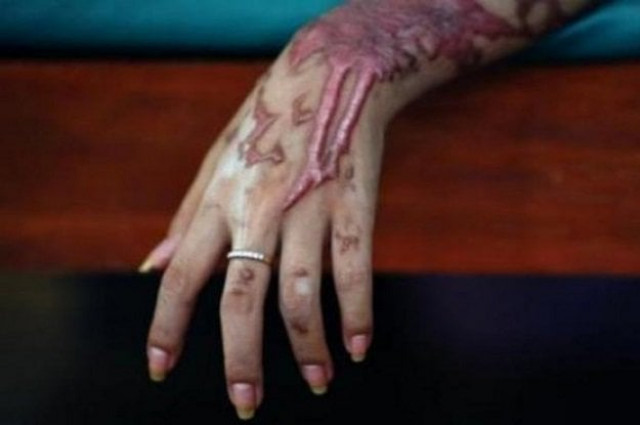The invisible scourge of violence against women in FATA
No stats available with FATA Secretariat while local media also chooses to stay mum

PHOTO: File
Accurate reporting of violence against women and stats are hard to come by. The Human Rights Commission of Pakistan keeps a watch on these incidents.
According to HRCP’s website, more than 16,498 cases of honour killings of men and women have been reported since 2004. Of these, 561 cases were reported last year.
However, HRCP tabulates the numbers based on media reports and given that many honour killings go unreported, its figures are just a tip of the iceberg.
Violence against women is prevalent across the country, and in the absence of any record-keeping, it may not be wrong to assume that it thrives in the Federally Administered Tribal Areas (Fata) where women are virtually non-existent in the public sphere.
How many women have been killed in the name of honour, domestic violence and even terrorism in Fata? No one knows. Even the FATA Secretariat has no statistics. What do exist are the stories of violence and cold-blooded murder.
Naheed*, only 25, a resident of Central Kurram Agency, lies helpless in her hospital bed. The damage to her face is such that one cannot bear to look at her for too long. The burnt skin had created something akin to a mask of black grit.
Doctors had managed to salvage some of her once-beautiful face, but what emerged after the skin healed over was just taut, nearly unnatural white skin, like that of silent mannequin’s blank gaze.
“They spilt boiling oil on me and my children,” she says in a barely audible voice.
The doctors treating her in Peshawar say she is lucky to have survived.
The details of what happened to Naheed remain murky because the village she belongs to has vowed to keep the matter suppressed. What’s only known is that her in-laws did this to her because of a domestic dispute.
Honour killings on the rise in Swat
In another case, a 12-year-old was shot dead by her uncle in Khyber Agency. She had been found on the road by local authorities and they handed her back to her family after the family paid Rs1 million in guarantee that they won’t kill her.
Her uncle did that on July 4, taking a gun to her despite the ‘guarantee’ to local authorities because the family thought she was out on the road because she had eloped with someone.
“We had to hand her over to the family because there is no place for women to be in protective custody in our lock-ups,” a senior government official from Fata told The Express Tribune.
Local media has remained mum on what happened to her even though four men have been taken into custody. The local rewaj (custom) allows space for such violent acts against women and for such deafening silence on the issue.
“We have to keep silent and look for a solution through arbitration,” said the official, requesting that he not be name for fear of retribution from local tribes. “You do not want to add to an already volatile situation,” he said, with an unhelpful smirk.
The Express Tribune asked almost six senior officials responsible for the administration and security in Fata one single question. “Did you ever hear about violence against women in Fata and an effort to resolve the issues?”
Their response: a categorical and instant, “No.”
Widow, daughter attacked with acid in Kurram
Writing about violence against women in the tribal belt is dangerous, at times even more dangerous than reporting on terrorism. So the local media is reluctant and stays away from reporting such news.
In terms of figures, Fata is a void, but taking Khyber-Pakhtunhwa police’s data as a baseline since the socio-cultural dynamics between both regions are arguably the same, there were 583 cases of violence against women in K-P in the last 10 months of 2016. A majority of these were rape and murder cases. Even in the settled districts, investigating officials believe that a majority of the cases go unreported because families prefer ‘local’ solutions.
In contrast, there is hardly any rape case reported in Fata. Most of the cases only make their way to the Fata Tribunal only when highlighted in the national media.
“This is the Rewaj Act they are trying to legitimise,” says Saba Gul Khattak, a member of the K-P Commission on the Status of Women, referring to the recommendations of the FATA Reforms Committee sought from the Parliament.
“The patriarchy is evident,” she says, “They did not even involve a single woman while deciding all the laws as though they (women) did not exist.”
Muslim aspiring model severely injured in London acid attack on her 21st birthday
The Frontier Crimes Regulation, in place in Fata since 1901, mostly leaves the fate of cases related to women in the hands of the local tribes.
“They could not even pass the law for domestic violence, [having women-protection laws] in Fata is a distant dream,” she says about the K-P legislators.
As she speaks, news breaks that another victim from K-P Almas Bibi, who was tortured, doused in petrol and set on fire by her in-laws in Nowshera late June, has succumbed to her injuries.
The HRCP had written a letter to the K-P government to take notice of the case on July 4. It’s too late for Almas now but the question remains: will her perpetrators ever be punished?
*Name of the victim changed to protect identity












COMMENTS
Comments are moderated and generally will be posted if they are on-topic and not abusive.
For more information, please see our Comments FAQ